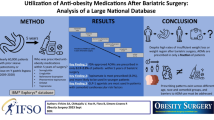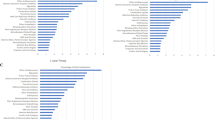Abstract
Purpose
Bariatric surgery can influence the prevalence and incidence of comorbidities, as well as the pharmacokinetics of drugs. This might lead to changes in the use of drugs. This study aimed to assess the influence of bariatric surgery on the use of medication in patients before and after surgery, focusing on type, number of medications, and daily dosage.
Methods
In a retrospective and prospective observational study, drug dispensing data from pharmacies of patients undergoing their first bariatric surgery between January 2008 and September 2011 was collected. Dispensing data from 1 month before until 12 months after surgery was analyzed. Drugs were classified according to the WHO-ATC classification system. Dosages of drugs were compared using defined daily dose (DDD).
Results
Among 450 patients, 12 months after surgery, the mean number of drugs per patient for antidiabetics, drugs acting on the cardiovascular system, anti-inflammatory and antirheumatic drugs, and drugs for obstructed airway diseases decreased by, respectively, 71.3 % (95 % CI 57.2 to 85.4), 34.5 % (95 % CI 28.2 to 43.0), 45.5 % (95 % CI 13.3 to 72.6), and 33.1 % (95 % CI 15.3 to 53.2). Patients used lower median DDD of oral antidiabetics, beta-blocking agents, and lipid-modifying drugs.
Conclusions
For some major drug classes 12 months after bariatric surgery, the use of drugs decreases in terms of mean number per patient. A reduction in dose intensity was observed for oral antidiabetics, beta-blocking agents, and lipid-modifying drugs. Dispensing data from pharmacies may provide detailed information on the use of medications by patients after bariatric surgery.

Similar content being viewed by others
References
Ioannides-Demos LL, Piccenna L, McNeill JJ (2011) Pharmacotherapies for obesity: past, current and future therapies. J Obes 179674. doi:10.1155/2011/179674
Leff DR, Heath D (2009) Surgery for obesity in adulthood. BMJ 339:b3402
Gloy VL, Briel M, Bhatt DL et al (2013) Bariatric surgery versus non-surgical treatment for obesity: a systematic review and meta-analysis of randomised controlled trials. BMJ 347:f5934
Padwal R, Brocks D, Sharma AM (2010) A systematic review of drug absorption following bariatric surgery and its theoretical complications. Obes Rev 11:41–50
Yska JP, Van der Linde S, Tapper VV et al (2013) Influence of bariatric surgery on the use and pharmacokinetics of some major drug classes. Obes Surg 23:819–25
Malone M, Alger-Mayer SA (2005) Medication use patterns after gastric bypass surgery for weight management. Ann Pharmacother 39:637–42
Hodo DM, Waller JL, Martindale RG et al (2008) Medication use after bariatric surgery in a managed care cohort. Surg Obes Relat Dis 4:601–7
Segal JB, Clark JM, Shore AD et al (2009) Prompt reduction in use of medications for comorbid conditions after bariatric surgery. Obes Surg 19:1646–56
Lizer MH, Papageorgeon H, Glembot TM (2010) Nutritional and pharmacologic challenges in the bariatric surgery patient. Obes Surg 20:1654–9
Crémieux PY, Ledoux S, Clerici C et al (2010) The impact of bariatric surgery on comorbidities and medication use among obese patients. Obes Surg 20:861–70
Maciejewski ML, Livinston EH, Kahwati LC et al (2010) Discontinuation of diabetes and lipid-lowering medications after bariatric surgery at Veterans Affairs medical centers. Surg Obes Relat Dis 6:601–7
Cunningham JL, Merrell CC, Sarr M et al (2012) Investigation of antidepressant medication usage after bariatric surgery. Obes Surg 22:530–5
Schauer PR, Kashyap SR, Wolski K et al (2012) Bariatric surgery versus intensive medical therapy in obese patients with diabetes. N Eng J Med 366:1567–76
WHO Collaborating Centre for Drug Statistics Methodology (2015) ATC classification index with DDDs. http://www.whocc.no/atc_ddd_index/ (accessed 30 January 2015)
World Health Organization. Introduction to drug utilization research. 2003. http://apps.who.int/medicinedocs/pdf/s4876e/s4876e.pdf (accessed 30 January 2015)
Mechanick JI, Youdim A, Jones DB et al (2013) Clinical practice guidelines for the perioperative, nutritional, metabolic, and nonsurgical support of the bariatric surgery patient—2013 update: cosponsored by American Association of Clinical Endocrinologists, The Obesity Society, and American Society for Metabolic & Bariatric Surgery. Surg Obes Relat Dis 9:159–91
Fried M, Yumuk V, Oppert JM (2014) Interdisciplinary European guidelines on metabolic and bariatric surgery. Obes Surg 24:42–55
Coblijn UK, Goucham AB, Lagarde SM et al (2014) Development of ulcer disease after Roux-en-Y gastric bypass, incidence, risk factors, and patient presentation: a systematic review. Obes Surg 24:299–309
Yska JP, van Roon EN, de Boer A et al (2015) Remission of type 2 diabetes mellitus in patients after different types of bariatric surgery: a population-based cohort study in the United Kingdom. JAMA Surg. doi:10.1001/jamasurg.2015.2398
Acknowledgments
We thank NJGM Veeger, PhD, clinical epidemiologist, Medical Centre Leeuwarden, for his statistical help.
Author information
Authors and Affiliations
Corresponding author
Ethics declarations
Funding
No funding was received for this study.
Conflict of interest
The authors declare that they have no conflict of interest.
Rights and permissions
About this article
Cite this article
Yska, J.P., van der Meer, D.H., Dreijer, A.R. et al. Influence of bariatric surgery on the use of medication. Eur J Clin Pharmacol 72, 203–209 (2016). https://doi.org/10.1007/s00228-015-1971-3
Received:
Accepted:
Published:
Issue Date:
DOI: https://doi.org/10.1007/s00228-015-1971-3




